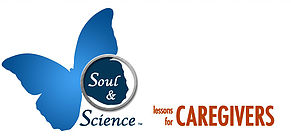BOOKS

70 times Seven Times: On the Art of Spiritual Forgiveness
―Joan Borysenko, PhD/Audiobook available on Amazon
 Seventy Times Seven Joan Borysenko Early Christianity’s Lost Treasure: Forgiveness Seventy Times Seven takes us back to the time of Jesus, when this prophet and teacher first emerged as the embodiment of a then little-known spiritual principle: forgiveness. When Jesus was asked how many times we must forgive one another, he replied: “Seventy times seven.” Within this response, biologist and mind/body authority Dr. Joan Borysenko shows, is an overlooked truth of profound significance to our spiritual growth, emotional wellness, and physical health. With ancient numerological origins, it is an emblem for completion at the highest possible level – the spiritual and physical outcome of the forgiveness process. Through step-by-step meditations, historical examples, and bio-spiritual insights, Seventy Times Seven will help you rediscover this treasured, sacred practice.
Seventy Times Seven Joan Borysenko Early Christianity’s Lost Treasure: Forgiveness Seventy Times Seven takes us back to the time of Jesus, when this prophet and teacher first emerged as the embodiment of a then little-known spiritual principle: forgiveness. When Jesus was asked how many times we must forgive one another, he replied: “Seventy times seven.” Within this response, biologist and mind/body authority Dr. Joan Borysenko shows, is an overlooked truth of profound significance to our spiritual growth, emotional wellness, and physical health. With ancient numerological origins, it is an emblem for completion at the highest possible level – the spiritual and physical outcome of the forgiveness process. Through step-by-step meditations, historical examples, and bio-spiritual insights, Seventy Times Seven will help you rediscover this treasured, sacred practice.
Forgiveness and Health: Scientific Evidence and Theories Relating Forgiveness to Better Health
―Loren Toussaint (Editor), Everett Worthington (Editor), David R. Williams (Editor), 2015
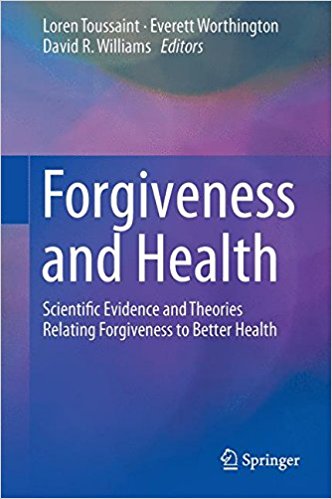 This volume collects the state-of-the-art research on forgiveness and mental and physical health and well-being. It focuses specifically on connections between forgiveness and its health and well-being benefits. Forgiveness has been examined from a variety of perspectives, including the moral, ethical and philosophical. Ways in which to become more forgiving and evolutionary theories of revenge and forgiveness have also been investigated and proposed. However, little attention has been paid to the benefits of forgiveness.
This volume collects the state-of-the-art research on forgiveness and mental and physical health and well-being. It focuses specifically on connections between forgiveness and its health and well-being benefits. Forgiveness has been examined from a variety of perspectives, including the moral, ethical and philosophical. Ways in which to become more forgiving and evolutionary theories of revenge and forgiveness have also been investigated and proposed. However, little attention has been paid to the benefits of forgiveness.
This volume offers an examination of the theory, methods and research utilized in understanding these connections. It considers trait and state forgiveness, emotional and decisional forgiveness, and interventions to promote forgiveness, all with an eye toward the positive effects of forgiveness for a victim’s health and well-being. Finally, this volume considers key moderators such as gender, race, and age, as well as, explanatory mechanisms that might mediate links between forgiveness and key outcomes.
Don’t Forgive Too Soon
―Matthew, Dennis and Sheila Linn, Paulist Press
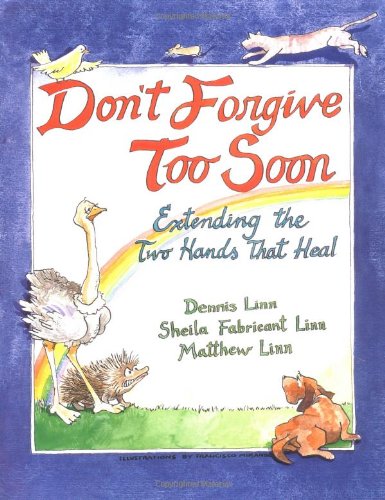 This book masterly shows how to forgive in an active, healthy way by moving through a five step process that renounces vengeance and retaliation but is not passive or self-abusive in any way. The Linns parallel the five classical stages of Elisabeth Kubler-Ross with the process of forgiveness.
This book masterly shows how to forgive in an active, healthy way by moving through a five step process that renounces vengeance and retaliation but is not passive or self-abusive in any way. The Linns parallel the five classical stages of Elisabeth Kubler-Ross with the process of forgiveness.
The Book of Forgiving: The Fourfold Path for Healing Ourselves and Our World
―Archbishop Desmond Tutu/ 2005
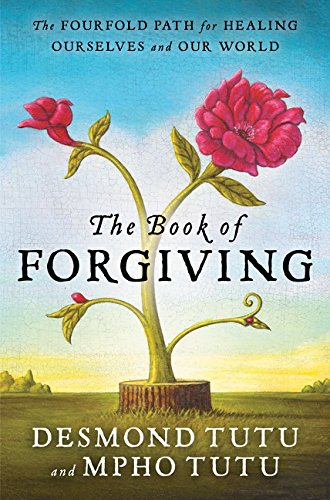 Archbishop Desmond Tutu, Nobel Peace Prize winner, Chair of The Elders, and Chair of South Africa’s Truth and Reconciliation Commission, along with his daughter, the Reverend Mpho Tutu, offer a manual on the art of forgiveness—helping us to realize that we are all capable of healing and transformation.
Archbishop Desmond Tutu, Nobel Peace Prize winner, Chair of The Elders, and Chair of South Africa’s Truth and Reconciliation Commission, along with his daughter, the Reverend Mpho Tutu, offer a manual on the art of forgiveness—helping us to realize that we are all capable of healing and transformation.
Tutu’s role as the Chair of the Truth and Reconciliation Commission taught him much about forgiveness. If you asked anyone what they thought was going to happen to South Africa after apartheid, almost universally it was predicted that the country would be devastated by a comprehensive bloodbath. Yet, instead of revenge and retribution, this new nation chose to tread the difficult path of confession, forgiveness, and reconciliation.
Each of us has a deep need to forgive and to be forgiven. After much reflection on the process of forgiveness, Tutu has seen that there are four important steps to healing: Admitting the wrong and acknowledging the harm; Telling one’s story and witnessing the anguish; Asking for forgiveness and granting forgiveness; and renewing or releasing the relationship. Forgiveness is hard work. Sometimes it even feels like an impossible task. But it is only through walking this fourfold path that Tutu says we can free ourselves of the endless and unyielding cycle of pain and retribution. The Book of Forgiving is both a touchstone and a tool, offering Tutu’s wise advice and showing the way to experience forgiveness. Ultimately, forgiving is the only means we have to heal ourselves and our aching world.
Forgiveness Therapy: An Empirical Guide for Resolving Anger and Restoring Hope
―Robert D. Enright and Richard P. Fitzgibbons
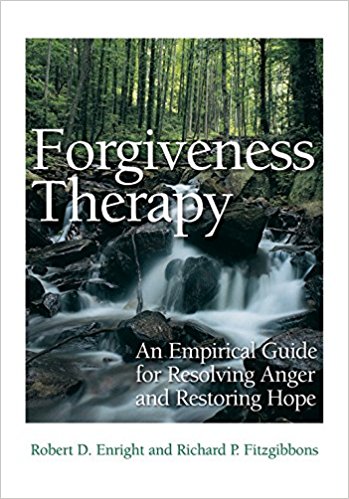 Benefiting from over 13 years of new research, the second edition of Helping Clients Forgive, now retitled Forgiveness Therapy, updates and expands the pioneering work of Doctors Enright and Fitzgibbons. The significant development of Forgiveness Therapy, and greater understanding of excessive anger in psychiatric disorders, make the second edition of this title a vital tool for clinicians interested in this unique method of therapy. Featuring entirely new chapters focused on Forgiveness Education and the legacy of those who enter forgiveness therapy, the second edition also expands all of the text with new case studies, new empirical evaluation, modern philosophical roots of forgiveness therapy, and new measurement techniques.
Benefiting from over 13 years of new research, the second edition of Helping Clients Forgive, now retitled Forgiveness Therapy, updates and expands the pioneering work of Doctors Enright and Fitzgibbons. The significant development of Forgiveness Therapy, and greater understanding of excessive anger in psychiatric disorders, make the second edition of this title a vital tool for clinicians interested in this unique method of therapy. Featuring entirely new chapters focused on Forgiveness Education and the legacy of those who enter forgiveness therapy, the second edition also expands all of the text with new case studies, new empirical evaluation, modern philosophical roots of forgiveness therapy, and new measurement techniques.
The Psychology of Gratitude
―Robert A. Emmons (Editor), Michael E. McCullough (Editor), 2004
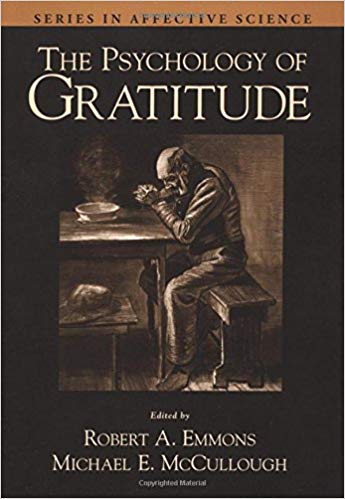 Gratitude, like other positive emotions, has inspired many theological and philosophical writings, but it has inspired very little vigorous, empirical research. In an effort to remedy this oversight, this volume brings together prominent scientists from various disciplines to examine what has become known as the most-neglected emotion. The volume begins with the historical, philosophical, and theoretical foundations of gratitude, then presents the current research perspectives from social, personality, and developmental psychology, as well as from primatology, anthropology, and biology. The volume also includes a comprehensive, annotated bibliography of research on gratitude. This work contributes a great deal to the growing positive psychology initiative and to the scientific investigation of positive human emotions. It will be an invaluable resource for researchers and students in social, personality, and developmental, clinical, and health psychology, as well as to sociologists and cultural anthropologists.
Gratitude, like other positive emotions, has inspired many theological and philosophical writings, but it has inspired very little vigorous, empirical research. In an effort to remedy this oversight, this volume brings together prominent scientists from various disciplines to examine what has become known as the most-neglected emotion. The volume begins with the historical, philosophical, and theoretical foundations of gratitude, then presents the current research perspectives from social, personality, and developmental psychology, as well as from primatology, anthropology, and biology. The volume also includes a comprehensive, annotated bibliography of research on gratitude. This work contributes a great deal to the growing positive psychology initiative and to the scientific investigation of positive human emotions. It will be an invaluable resource for researchers and students in social, personality, and developmental, clinical, and health psychology, as well as to sociologists and cultural anthropologists.
The Four Things That Matter Most
―Ira Byock MD, Random House/Atria Books, 2005
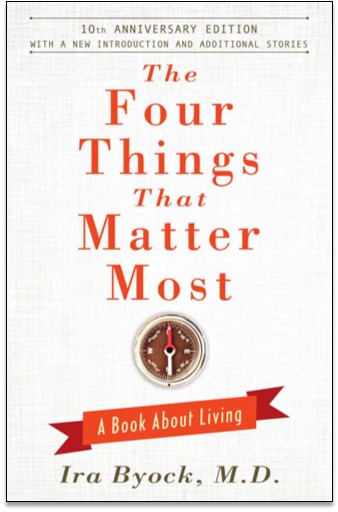 Four simple phrases — “Please forgive me,” “I forgive you,” “Thank you,” and “I love you” — carry enormous power. In many ways, they contain the most powerful words in our language. These four phrases provide us with a clear path to emotional wellness; they guide us through the thickets of interpersonal difficulties to a conscious way of living that is full of integrity and grace.In The Four Things That Matter Most, Dr. Ira Byock, an international leader in palliative care, teaches us how to practice these life-affirming words in our day-to-day lives. Too often we assume that the people we love really know we love them. Dr. Byock reveals the value of stating the obvious and provides insights into how we burden ourselves by hanging on to old grudges unconsciously and unnecessarily. He shows us how to avoid living with those awkward silences and uncomfortable issues that distance us from the people we love and erode our sense of well-being and joy. His insights and stories help us to forgive, appreciate, love, and celebrate one another more fully.
Four simple phrases — “Please forgive me,” “I forgive you,” “Thank you,” and “I love you” — carry enormous power. In many ways, they contain the most powerful words in our language. These four phrases provide us with a clear path to emotional wellness; they guide us through the thickets of interpersonal difficulties to a conscious way of living that is full of integrity and grace.In The Four Things That Matter Most, Dr. Ira Byock, an international leader in palliative care, teaches us how to practice these life-affirming words in our day-to-day lives. Too often we assume that the people we love really know we love them. Dr. Byock reveals the value of stating the obvious and provides insights into how we burden ourselves by hanging on to old grudges unconsciously and unnecessarily. He shows us how to avoid living with those awkward silences and uncomfortable issues that distance us from the people we love and erode our sense of well-being and joy. His insights and stories help us to forgive, appreciate, love, and celebrate one another more fully.
The American Book of Living & Dying: Lessons in Healing Spiritual Pain
―Richard Groves & Henriette Anne Klauser, Random House/Ten Speed Press, 2010
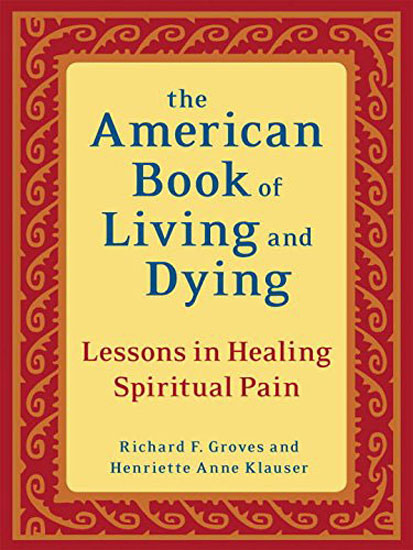 Internationally acclaimed book co-authored by Soul & Science presenter, Richard Groves. New York Times review says, “As groundbreaking as the work of Elisabeth Kubler-Ross…”
Internationally acclaimed book co-authored by Soul & Science presenter, Richard Groves. New York Times review says, “As groundbreaking as the work of Elisabeth Kubler-Ross…”
For most people, the thought of dying or caring for a terminally ill friend or family member raises fears and questions as old as humanity: What is a “good death”? What appropriate preparations should be made? How do we best support our loved ones as life draws to its close? In this nondenominational handbook, Richard F. Groves and Henriette Anne Klauser provide comfort, direction, and hope to the dying and their caregivers through nine archetypal stories that illustrate the most common end-of-life concerns. Drawing from personal experiences, the authors offer invaluable guidance on easing emotional pain and navigating this difficult final passage.
With a compelling new preface, this edition also features an overview of the hospice movement; a survey of Celtic, Tibetan, Egyptian, and other historic perspectives on the sacred art of dying; as well as various therapies, techniques, and rituals to alleviate suffering, stimulate reflection, and strengthen interpersonal bonds. The American Book of Living and Dying gives us courage to trust our deepest instincts, and reminds us that by telling the stories of those who have passed, we remember, honor, and continue to learn from them.
Focus of this book parallels this Soul & Science program series and offers nine case studies and best practices related to person’s dealing with spiritual pain at the end of life.
Forgive for Good: A Proven Prescription for Health and Happiness
―Frederic Luskin, 2003
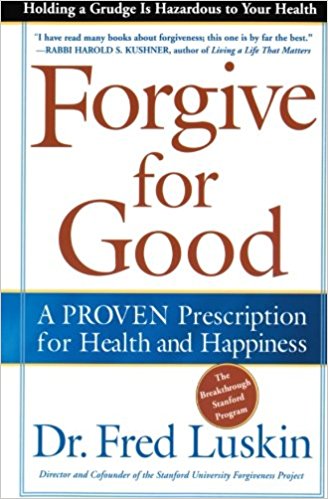 Based on scientific research, this groundbreaking study from the frontiers of psychology and medicine offers startling new insight into the healing powers and medical benefits of forgiveness. Through vivid examples (including his work with victims from both sides of Northern Ireland’s civil war), Dr. Fred Luskin offers a proven nine-step forgiveness method that makes it possible to move beyond being a victim to a life of improved health and contentment.
Based on scientific research, this groundbreaking study from the frontiers of psychology and medicine offers startling new insight into the healing powers and medical benefits of forgiveness. Through vivid examples (including his work with victims from both sides of Northern Ireland’s civil war), Dr. Fred Luskin offers a proven nine-step forgiveness method that makes it possible to move beyond being a victim to a life of improved health and contentment.
